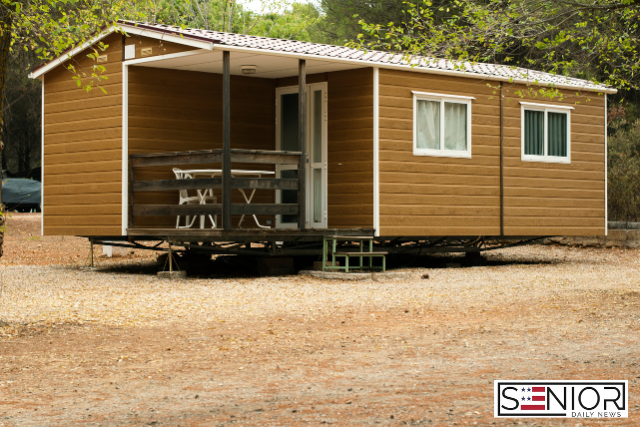Mobile Homes vs. Tiny Houses for Retirees

Retirement often opens the door to exciting lifestyle changes. For many seniors in the United States, downsizing is a smart step toward financial freedom, simplified living, and less maintenance. Two popular housing options gaining attention are mobile homes and tiny houses. But which one is better for retirees?
Let’s explore the benefits, drawbacks, and lifestyle fit of each option to help you make an informed and confident decision.
What Is a Mobile Home?
A mobile home, also known as a manufactured home, is a prefabricated structure built in a factory and transported to a specific site. These homes can be placed in mobile home parks, private land, or retirement communities.
Mobile homes have come a long way from the stereotypical trailers of the past. Today’s models are often spacious, energy-efficient, and customizable to your needs.
What Is a Tiny House?
A tiny house is a compact, typically under 400-square-foot dwelling that emphasizes minimalist living. They can be built on wheels (tiny house on wheels, or THOW) or on a foundation. Tiny houses are part of a growing movement focused on affordable, eco-conscious, and clutter-free living.
For retirees seeking simplicity and lower costs, tiny houses have become an appealing option—especially for those who want to travel or live off the grid.
Mobile Homes for Retirees: Pros and Cons
Pros
1. Affordability
Mobile homes are often more affordable than traditional houses and even many apartments. The average cost of a new single-wide is around $50,000–$70,000, making it a great option for retirees on a fixed income.
2. Community Living
Many retirees live in 55+ mobile home parks that offer shared amenities like clubhouses, swimming pools, and social events. This can be a great way to stay active and connected.
3. Space and Comfort
Most mobile homes are roomier than tiny houses, with multiple bedrooms and full-sized kitchens and bathrooms. This makes them ideal for couples or those who need space for hobbies or guests.
4. Easy Financing Options
It’s generally easier to find financing for a mobile home than for a tiny house, especially if it’s placed on owned land or in a park.
Cons
1. Depreciation
Unlike traditional homes, mobile homes tend to depreciate in value over time, especially if located on rented land.
2. Park Fees
If placed in a mobile home park, you may need to pay lot rent, which can range from $300 to $800 a month depending on location.
3. Limited Mobility
Despite the name, mobile homes aren’t easy to move once set up. Moving one can cost thousands and require permits.
Tiny Houses for Retirees: Pros and Cons
Pros
1. Low Cost of Living
Tiny houses can be built for $20,000 to $80,000 depending on design and location. With fewer utilities and maintenance costs, they’re very economical in the long run.
2. Minimalist Lifestyle
Living in a tiny house encourages you to focus on what matters most. Less space means fewer belongings, which can be liberating for retirees seeking a fresh start.
3. Eco-Friendly
Tiny homes often use sustainable materials, solar power, and composting toilets, reducing your carbon footprint and utility bills.
4. Mobility
If built on wheels, a tiny house offers the freedom to travel across the country without leaving home. This can be ideal for retirees who crave adventure.
Cons
1. Limited Space
Tiny houses can feel cramped, especially if you have mobility issues, pets, or frequent visitors. There’s little room for storage or luxury items.
2. Zoning and Legal Issues
Many towns have strict regulations that make it difficult to legally live full-time in a tiny home. Always check local zoning laws before building or buying.
3. Financing Challenges
Getting a mortgage or traditional loan for a tiny home can be difficult, especially if it’s mobile or not classified as real estate.
4. Upkeep and Repairs
Because tiny houses are often custom-built or DIY projects, finding repair services can be tricky, especially for non-standard components.
Lifestyle Considerations
Health and Accessibility
- Mobile homes often offer step-free entry, wide hallways, and room for accessible features like walk-in tubs or stair lifts.
- Tiny houses can be challenging for seniors with mobility issues due to narrow staircases, ladders, and limited space.
Climate and Weather
- Mobile homes are designed to meet HUD safety standards and can withstand various climates better than some tiny houses.
- Tiny homes, particularly on wheels, may not be insulated for extreme temperatures unless designed specifically for it.
Social Interaction
- Mobile home communities often promote a strong sense of community with activities and clubs.
- Tiny home living can be more isolated, unless located within a tiny house village or shared property.
Which Is Better for Retirees?
The best choice depends on your personal values, financial situation, and lifestyle goals:
- If you value community, comfort, and convenience, a mobile home in a retirement park may be ideal.
- If you’re focused on independence, minimalism, and mobility, a tiny house might better suit your spirit.
Some retirees even start with a tiny house and later transition to a mobile home for more comfort as they age.
Frequently Asked Questions (FAQs)
Q: Can I get a mortgage for a mobile home or tiny house?
Mobile homes are often eligible for loans through HUD or private lenders, especially if they’re on permanent foundations. Tiny homes are trickier—most buyers need personal loans or pay in cash.
Q: Are there age-restricted tiny house communities like mobile home parks?
Currently, very few tiny house communities are age-restricted, but some are senior-friendly. Always inquire about the community’s focus before moving in.
Q: Which is safer in extreme weather?
Modern mobile homes meet federal safety standards and are often safer in storms than tiny homes on wheels, which can be vulnerable unless anchored and insulated properly.
Q: Is insurance available for both options?
Yes, but it may be easier and cheaper to insure a mobile home, especially one classified as real estate. Tiny houses may require specialty insurance.
Q: Can I live in a tiny house legally year-round?
It depends on your local zoning laws. Some areas allow full-time living in tiny houses; others restrict it or require them to be on permanent foundations.
Image Designed Using Canva






